|
|
|
Sort Order |
|
|
|
Items / Page
|
|
|
|
|
|
|
| Srl | Item |
| 1 |
ID:
170435
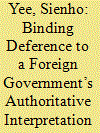

|
|
|
|
|
| Summary/Abstract |
This amicus brief for China Chamber of International Commerce was filed on 4 April 2018 in Animal Science Products, Inc. v. Hebei Welcome Pharmaceutical Co., No. 16-1220 in the US Supreme Court, which was decided on 14 June 2018. The brief argues that: I. Rule 44.1 of the US Federal Rules of Civil Procedure addresses only what materials may be used in determining foreign law, not what effect to give to these materials, which effect must be determined on considerations outside the Rule, and is consistent with whatever effect properly derived, including “binding deference”; II. A distinction must be made, among the materials used to determine foreign law, between what may count as applicable law and the subsidiary means for determining applicable law, and the interpretation or characterization of Chinese trade law by MOFCOM counts as applicable law; III. The Pink precedent demands that binding deference be given to the interpretation or characterization of Chinese trade law by MOFCOM as the authoritative decision-maker in this area; IV. The act of state doctrine as reflected in Sabbatino also supports binding deference to the interpretation or characterization of Chinese trade law by MOFCOM as the authoritative decision-maker in this area; V. Alternatively and subsidiarily, the interpretation or characterization of Chinese trade law by MOFCOM as the highest administrative authority on trade law in China should be given substantial deference analogous to Chevron deference; and VI. The alleged inconsistency between China’s representations to the WTO and its position in this case, even assumed to exist, does not affect the validity of its position in this case as a matter of domestic law and therefore the binding deference due to it.
|
|
|
|
|
|
|
|
|
|
|
|
|
|
|
|
| 2 |
ID:
189697
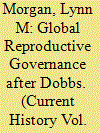

|
|
|
|
|
| Summary/Abstract |
The 2022 US Supreme Court decision Dobbs v. Jackson Women’s Health overturned the constitutional right to abortion, raising questions about the international implications of the ruling. The Dobbs decision reveals a growing rift in global reproductive governance between countries that rely on international human rights standards and those that do not. The global momentum is currently with the human rights contingent, but the Dobbs ruling reflects the logic of a global antiabortion coalition that would like each country to decide its own life and family laws, without interference from multilateral agencies, based on its own constitution, history, and traditions.
|
|
|
|
|
|
|
|
|
|
|
|
|
|
|
|
| 3 |
ID:
120807


|
|
|
|
|
| Publication |
2013.
|
| Summary/Abstract |
Hardly the blow to democracy that many painted it as, the U.S. Supreme Court's decision in Citizens United will make American politics more competitive, less beholden to party bosses, and more responsive to the public at large. It may even help break the fiscal stalemate strangling the U.S. economy.
|
|
|
|
|
|
|
|
|
|
|
|
|
|
|
|
| 4 |
ID:
090359
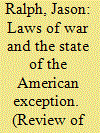

|
|
|
|
|
| Publication |
2009.
|
| Summary/Abstract |
This article examines the US response to the 9/11 terrorist attacks using Carl Schmitt's concept of the exception. It argues that the Bush administration's response is consistent with Schmitt's view, which argued that US policy continued the historical practice of drawing lines that separated 'civilisation' from zones of exception where the normal laws governing warfare did not apply. This suggests that the state of exception declared after 9/11 is not contingent on the rise and fall of the terrorist threat, rather it is the latest manifestation of 'global linear thinking' and therefore a permanent feature of American hegemony. However, the article does not accept this pessimistic conclusion. US policy since 9/11 fits squarely with a Schmittian explanation only because conservative nationalists have used the war on terror to help reconstruct a sense of American 'exceptionalism'. An alternative reading of how American liberalism should respond to terrorism can be found in the manner in which the Bush administration's policy was rejected by the US Supreme Court.
|
|
|
|
|
|
|
|
|
|
|
|
|
|
|
|
| 5 |
ID:
114125
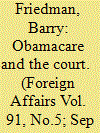

|
|
|
|
|
| Publication |
2012.
|
| Summary/Abstract |
Pundits predicted that the U.S. Supreme Court's ruling on the Affordable Care Act would make history. In fact, by upholding the individual mandate as a tax, the justices took themselves largely out of the picture, ensuring that the debate over health care will play out in the political sphere, where it belongs.
|
|
|
|
|
|
|
|
|
|
|
|
|
|
|
|
| 6 |
ID:
127790


|
|
|
|
|
| Publication |
2014.
|
| Summary/Abstract |
Interest groups often make their preferences known on cases before the U.S. Supreme Court via amicus curiae briefs. In evaluating the case and related arguments, we posit that judges take into account more than just the number of supporters for the liberal and conservative positions. Specifically, judges' decisions may also reflect the relative power of the groups. We use network position to measure interest group power in U.S. Supreme Court cases from 1946 to 2001. We find that the effect of interest group power is minimal in times of heavily advantaged cases. However, when the two sides of a case are approximately equal in the number of briefs, such power is a valuable signal to judges. We also show that justice ideology moderates the effect of liberal interest group power. The results corroborate previous findings on the influence of amicus curiae briefs and add a nuanced understanding of the conditions under which the quality and reputation of interest groups matter, not just the quantity.
|
|
|
|
|
|
|
|
|
|
|
|
|
|
|
|
| 7 |
ID:
100845
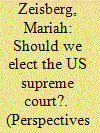

|
|
|
|
|
| Publication |
2009.
|
| Summary/Abstract |
Extensive political science research reveals that the decisions of the US Supreme Court are deeply political. And both advocates and critics of judicial elections concede that partisan elections are a democratic method of judicial selection. Does the value of democratic representation mean that US Supreme Court Justices should be selected through partisan elections? I argue not. Partisan judicial elections are actually far poorer institutional mechanisms for capturing the judgment of the people on legal matters than has been recognized. The role of parties in structuring a campaign distorts the deliberative environment surrounding judicial elections, creating significant barriers to voters expressing a judgment on matters of legal meaning. The kind of distortion is best understood through reference to a processual criterion of deliberative democracy, which provides a fitting normative template to ground theoretical inquiry into the reason-giving possibilities of existing democratic institutions and practices. Hence, answering why the US Supreme Court should not be elected on democratic grounds also reveals new insights about the role of parties in sustaining (or subverting) deliberative democratic ideals.
|
|
|
|
|
|
|
|
|
|
|
|
|
|
|
|
| 8 |
ID:
118976
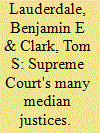

|
|
|
|
|
| Publication |
2012.
|
| Summary/Abstract |
One-dimensional spatial models have come to inform much theorizing and research on the U.S. Supreme Court. However, we argue that judicial preferences vary considerably across areas of the law, and that limitations in our ability to measure those preferences have constrained the set of questions scholars pursue. We introduce a new approach, which makes use of information about substantive similarity among cases, to estimate judicial preferences that vary across substantive legal issues and over time. We show that a model allowing preferences to vary over substantive issues as well as over time is a significantly better predictor of judicial behavior than one that only allows preferences to vary over time. We find that judicial preferences are not reducible to simple left-right ideology and, as a consequence, there is substantial variation in the identity of the median justice across areas of the law during all periods of the modern court. These results suggest a need to reconsider empirical and theoretical research that hinges on the existence of a single pivotal median justice.
|
|
|
|
|
|
|
|
|
|
|
|
|
|
|
|
|
|
|
|
|